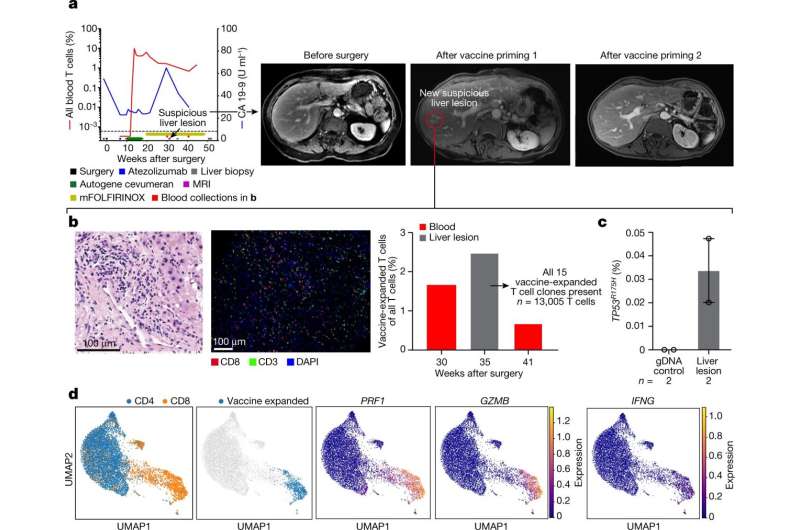
A large team of medical researchers at Memorial Sloan Kettering Cancer Center, in New York, working with colleagues from the Icahn School of Medicine at Mount Sinai and German firm BioNTech has developed a personalized mRNA vaccine that shows promise against an aggressive form of pancreatic cancer in clinical trial results.
In their study, reported in the journal Nature, the group demonstrated that T cells specific to pancreatic ductal adenocarcinoma neoantigens can be activated by individualized mRNA vaccines. Amanda Huff and Neeha Zaidi with the Johns Hopkins University School of Medicine have published a News & Views piece in the same journal issue outlining the work done by the team.
Pancreatic cancer is one of the deadliest types of cancer because it typically has no symptoms until its late stages, when it is difficult to treat. One type of pancreatic cancer, called pancreatic ductal adenocarcinoma (PDAC) is particularly deadly—it kills approximately 88% of those diagnosed with it, making it the third most deadly form of cancer in the U.S. Patients diagnosed with PDAC are generally given two options—make plans for dying or undergo medical and surgical treatment with fingers crossed.
In recent years, immune-checkpoint inhibitors, which are immunotherapeutic agents, have proven effective for several types of cancer. However, PDAC is not one of them, though the team now reports that personalized vaccines might make such an approach viable.
Immunotherapy works by inducing the immune system to attack tumors by recognizing proteins (neoantigens) on tumor cell surfaces. The research team found that an individualized mRNA vaccine can incite attack by T cells specific to the neoantigens on the tumor surface.
Initial testing of the vaccine was conducted with 16 volunteers, each of whom first had their tumors removed surgically. The tumors were then used to make 16 unique vaccines, which were administered to the patients. Each was also given chemotherapy and atezolizumab, a generic form of immunotherapy. A large T cell response was observed in half the patients, and 18 months later, none of them showed signs of cancer progression.
More information:
Luis A. Rojas et al, Personalized RNA neoantigen vaccines stimulate T cells in pancreatic cancer, Nature (2023). DOI: 10.1038/s41586-023-06063-y
Amanda L. Huff et al, Vaccine boosts T cells that target pancreatic tumours, Nature (2023). DOI: 10.1038/d41586-023-01526-8
Journal information:
Nature
Source: Read Full Article
